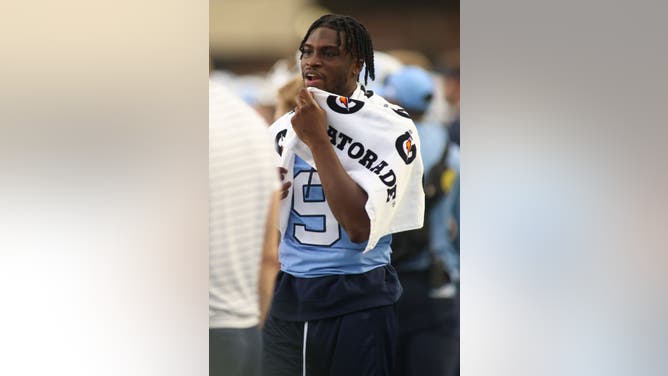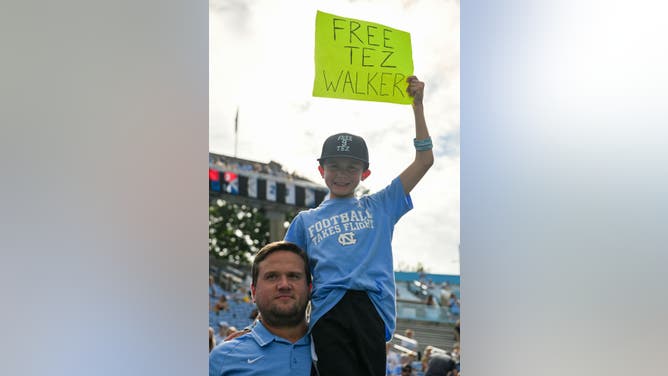NCAA Is Disgracing Itself In The Tez Walker Eligibility Debacle: Mary Katharine Ham
Tez Walker, a 3-star recruit out of West Charlotte High School, always wanted to play football at UNC. There are plenty of things that get in the way of young athletes’ dreams. These low-percentage plans in the minds of kids are stymied by injuries, lack of size or strength, bad grades, bad luck, bad behavior.
But Walker, a 6-2” wide receiver, didn’t hit the normal speed bumps. Little did he know, the obstacles he’d face would be mental health issues, a pandemic, and a new NCAA rule. The combo left him standing on the sidelines in early September, instead of making a triumphant debut in the Tar Heel line-up for a hometown crowd as UNC beat the University of South Carolina 31-17 in Charlotte.
It now seems that debut won’t come at all, as Walker lost a final appeal to the NCAA for eligibility last week.
Mack Brown Supports Tez
Walker’s coach, Mack Brown, said the NCAA “failed Tez and his family,” heaping scorn on the organization, concluding he’d “lost all faith in its ability to lead and govern our sport.”
It’s a little complicated how Walker got here, but his story is emblematic of the callousness too many in power showed toward the lives of young people during the pandemic. He’s an example of how heavy-handed Covid policies took these young lives off course, their effects lingering to crush dreams even more than three years later. Even when an athlete makes good-faith efforts to get back on track, the system is loath to make up for the years it took off the very narrow window a person has to be an elite athlete.
Walker planned to start his career at North Carolina Central University in fall 2020 after he took a gap year healing a knee injury. But his career didn’t actually start. The Mid-Eastern Atlantic Conference, to which NCCU belongs, canceled all fall sports July 16, 2020, “out of a concern for the safety as well as the physical and mental health of our student-athletes.” The announcement hinted at the possibility those seasons might be played in spring of 2021, but they were not.
NCCU announced a fall season in 2021, but Walker, having been through one canceled season in that conference, transferred to Kent State University, which had played an abbreviated season the year before. He played two seasons there before transferring back to Brown’s program in the Tar Heel State, starting classes Jan. 10, 2023.
One day later, the NCAA passed a new regulation designed to limit the number of players entering the transfer portal, which had ballooned to thousands, with athletes transferring three, four, five times over the last several seasons. The timing is important. Many things in NCAA decision-making are opaque or deliberately mystifying, but we know for sure that Walker was in the transfer portal, committed to a new school, and attending classes at his new school before the new rule went into effect. It was then retroactively applied to Walker’s career.
Under the new rule, if players want immediate eligibility after a second transfer, they must meet very specific criteria for a waiver. Without that waiver, they must forfeit one year of eligibility before taking the field, a scenario that has ended Walker’s college career.
The NCAA did not grandfather Walker under the old rules, as it should have. It then gave no consideration to the fact that his first year on a college football roster, and first transfer, shouldn't count because the school canceled its season entirely for Covid.

CHAPEL HILL, NC - SEPTEMBER 09: North Carolina Tar Heels wide receiver Devontez Walker (9) talks to a coach on the sidelines during the college football game between the North Carolina Tar Heels and the Appalachian State Mountaineers on September 9, 2023 at Kenan Memorial Stadium in Chapel Hill, NC. (Photo by Nicholas Faulkner/Icon Sportswire via Getty Images)
Instead, the organization told him his Covid-related concern about the 2021 season “was not unique,” as all were dealing with the “uncertain impact of the global pandemic on their future competitive opportunities.” Well, that’s not true because plenty of Division 1 schools managed to play in 2020. Those programs proved to be far better choices for athletes than those that canceled outdoor sports for a respiratory virus that didn’t affect young athletes. Students should have been able to choose to play in places committed to actually playing … without penalty.
Throughout the process, Walker asked the NCAA to consider his mental-health needs, which according to the new rule, would make him eligible for a waiver if bolstered by a professional’s opinion and demonstrated need. In his public statements, Walker has declined to get specific about this part of his story, but called his mental health struggles “similar to what many college students have dealt with during Covid.” He has also expressed a need to transfer back home to support his ailing grandmother in North Carolina.
Walker Is Not Without Supporters
Both NCCU and Kent State support Walker, a Dean’s List student, and filed paperwork with the NCAA supporting his immediate eligibility.
The NCAA is powerful, tight-lipped and capricious. No one really knows why Walker was rejected on every appeal, despite common sense, the timeline, and the rules seemingly being in his favor. We are left with plenty of questions and Walker on the sidelines. Meanwhile, Rice quarterback J.T. Daniels, who transferred four times under the old rules is playing, as he should, and Colorado running back Sy’veon Wilkerson received a waiver to play at his fourth school under the new rules, making Walker’s treatment look arbitrary and frankly mean-spirited.
To make matters worse, the NCAA’s response to Brown’s scathing statement was to suggest this student-athlete they’ve screwed over, and whose mental-health pleas they’ve denied, seek the increased mental-health services the NCAA is proud to say they’ve directed schools to offer.
Super.
The NCAA is showing a blind spot shared by so many organizations allegedly dedicated to young people in the pandemic years. The greatest mental- and physical-health resource was preserving normalcy and opportunities for them to the greatest extent possible during the pandemic. Schools should have stayed open. Outdoor sports and play spaces should have been available throughout. Young people should have had as many chances as possible to socialize and pursue their dreams in light of their extremely low risk profiles.

CHAPEL HILL, NORTH CAROLINA - SEPTEMBER 09: Fans hold a sign supporting Devontez "Tez" Walker #9 of the North Carolina Tar Heels before the game against the Appalachian State Mountaineers at Kenan Memorial Stadium on September 09, 2023 in Chapel Hill, North Carolina. The Tar Heels won 40-34 in double overtime. (Photo by Grant Halverson/Getty Images)
The NCAA could have compassion for Walker and admit he was ill-served by his college-sports programs and the NCAA and honor his attempts to make the best of a bad situation. But just like countless schools systems and teachers’ unions and mask-mandating bureaucrats before them, the NCAA is choosing to minimize what Walker lost to overzealous Covid policies, the mental-health problems that precipitated, and roundly reject its chance to help put things right.
As Brown notes, this is the opposite of a commitment to “mental health and student-athlete welfare,” and they should be ashamed of themselves.